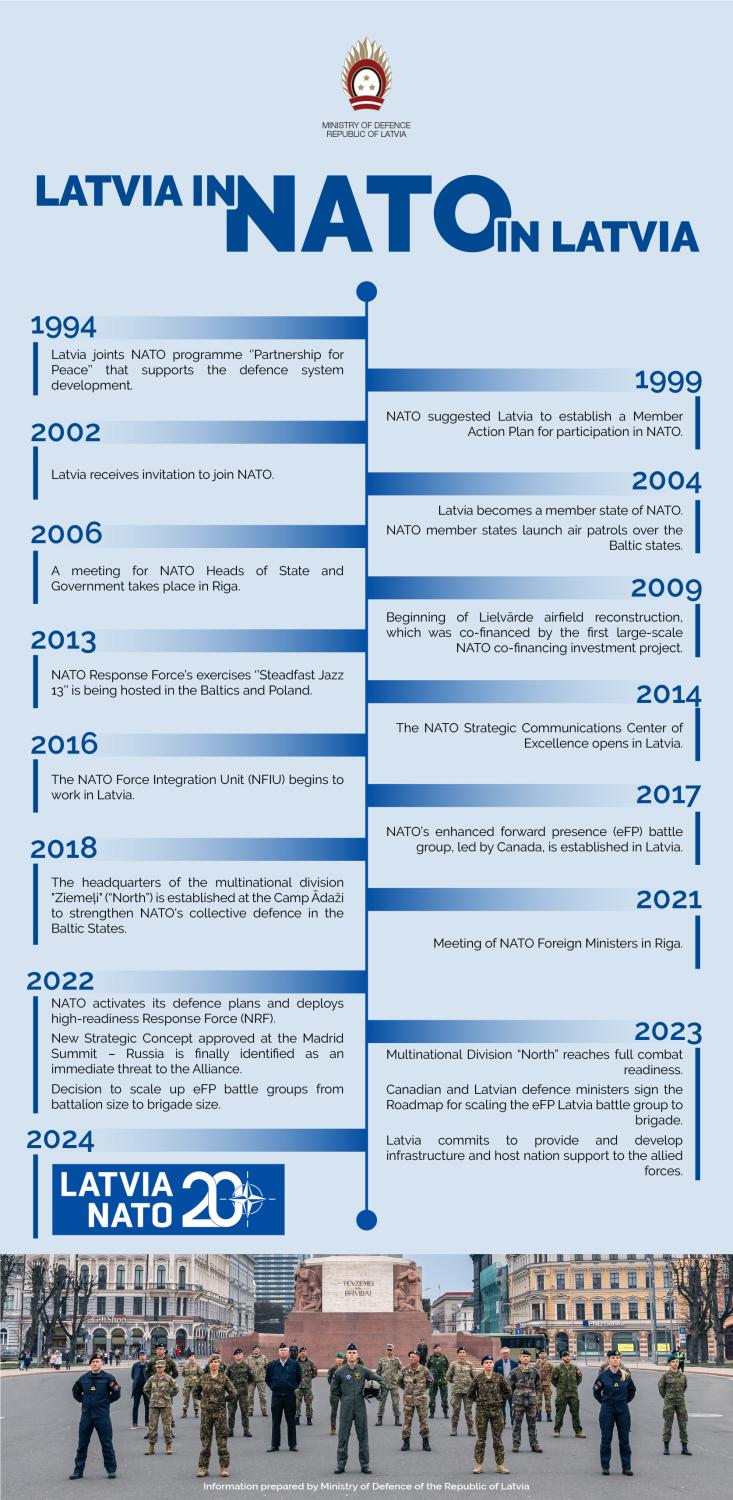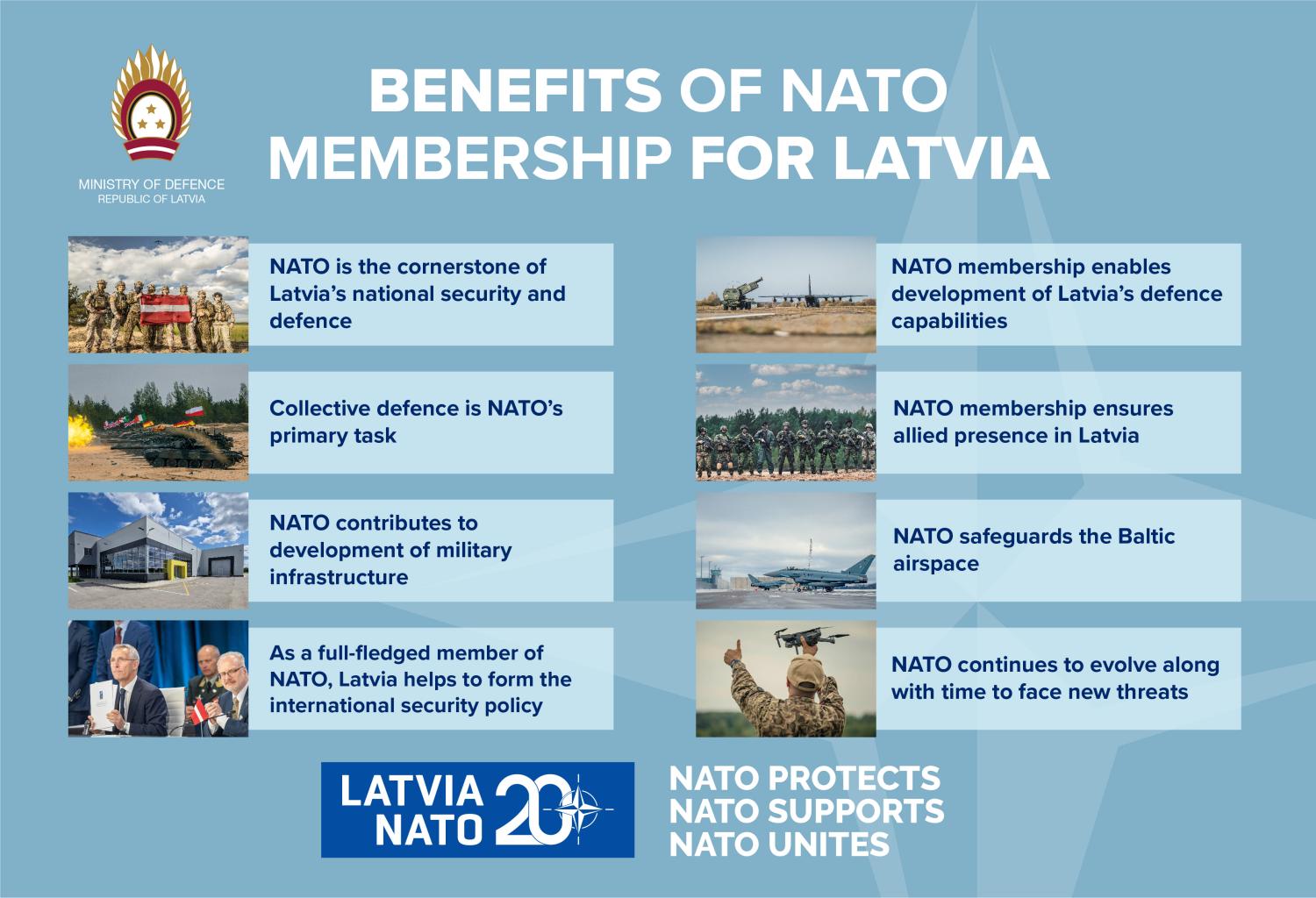Latvia and NATO
Joining NATO
Shortly after regaining of the independence of Latvia, development of the Latvian defence system was launched and collaboration with the North Atlantic Treaty Organization (NATO) was initiated. When reacting to the new security environment and the geo-political situation, on 20 December 1991, NATO founded the North Atlantic Cooperation Council (NACC) to collaborate with potential partners. Latvia also participated in the NACC foundation session, thus becoming a Member State of the forum.
In subsequent years, cooperation of Latvia with NATO became even more intense. In 1994, Latvia joined the programme “Partnership for Peace” established in the same year, which gave the possibility to take advantage of consultations of NATO civil and military specialists, their support and practical assistance in development of the defence system. In 1995, the participation in the “Partnership for Peace” programme also allowed Latvia to get involved in the NATO Planning and Review Process that, in subsequent years, facilitated compliance of the Latvian National Armed Forces with those of NATO Member States.
On 23―25 April 1999, at the NATO summit meeting in Washington, USA, NATO suggested Latvia and the other eight candidate states to elaborate a Member Action Plan (MAP) for participation in NATO by reflecting the entire preparatory process and measures for the participation in NATO therein. MAP would permit the states to receive additional consultations, support and practical assistance from NATO Member States.
On 21 November 2002, at the meeting of NATO Heads of state in Prague, Czech Republic, Latvia and six other candidate states were invited to join NATO. This marked the beginning of the last stage for Latvia for becoming a NATO Member State, which took place on 29 March 2004.

Latvia's membership in NATO
Latvia's national defence and security policy is implemented in accordance with the strategic principles, priorities and measures for national military defence in times of peace, national threat and war, as set out in the National Defence Concept approved by the Saeima, which emphasises that Latvia's defence is developed within the framework of NATO collective defence, providing deterrence and defence.
The benefits of NATO membership include collective defence in accordance with Article 5 of the North Atlantic Treaty, the presence of Allied Forces in Latvia, including the Multinational Brigade, the Multinational Division Headquarters "North" and other structures, joint exercises, the Baltic Air Policing Mission, and many others.
In 2022, the new NATO Strategic Concept was approved, which clearly defines Russia as the most significant and immediate threat to the security of the Allies and to peace and stability in the Euro-Atlantic area. It is important for Latvia that this Concept includes a fundamental change in the Alliance's approach to the defence of Allied territory, with the ambition of "forward defence" and the immediate reinforcement of forces in times of crisis and conflict.
In the process of NATO's transformation towards an allied force to respond to all types of threats, NATO Member States have identified the development of the NATO Response Force as one of the key tasks. This force is an effective means of both providing collective defence and addressing today's security challenges. With the new Regional Defence Plans approved at the 2023 NATO Vilnius Summit, the Allies also agreed on the establishment of a new multinational and multi-domain Allied Reaction Force (ARF), which will gradually replace the NATO Response Force.

Participation in NATO-led international operations
Latvia participates in NATO's capacity-building and in the Alliance's international operations and security enhancements. As part of this process, Latvia has developed a professional armed force that meets modern security requirements and is capable of engaging in both collective defence and crisis prevention activities.
Since 1996, when Latvian troops first began participating in the NATO-led operation in Bosnia and Herzegovina, Latvia has participated in all NATO-led operations in the Balkans, Iraq and Afghanistan. Latvia is currently participating in the NATO-led international operation in Kosovo (KFOR) with a contingent of troops, as well as in the NATO mission in Iraq (eNMI) with staff officers. Participation in international operations allows for practical testing of interoperability with the forces of other Member States and operational experience necessary for professional soldiers. At the same time, Latvia's practical participation in NATO-led operations allows to increase the effectiveness of operations and Latvia's political influence in the NATO decision-making process.
Allied presence in Latvia
The National Armed Forces must be prepared not only to participate in international operations, but also to host NATO forces on Latvian territory. In order to receive the necessary foreign assistance in the event of national threats or natural disasters, Latvia continues to develop a host nation support system for foreign armed forces and to develop the necessary capabilities and infrastructure for this purpose. One of the most prominent examples is the Selonia Military Training Area, the construction of which is one of the defence sector's priorities for the coming years. The Selonia Military Training Area will be the largest in the Baltic States. Such cooperation between Latvia and NATO, as well as the combination of capabilities, is a strong foundation for our national security and defence.
Air patrols in Latvia and the other Baltic States have been one of the first practical and visible factors that have increased our security since joining NATO. The air patrol operation has also been a direct demonstration of the willingness of other NATO countries to support us by volunteering for the operation. The patrols are provided on a rotational basis by NATO Member States, using military airfields in Šiauliai, Lithuania and Amari, Estonia as a base for their aircraft. The Baltic States themselves are gradually assuming more and more responsibility for the implementation of the operation, providing an increasing host nation support capability. In 2024, while the Amari base is under reconstruction, patrol missions will be conducted from Lielvārde military airfield.
Latvia, together with the other Alliance members, continues to develop cooperation with NATO partners. Latvia is interested in capable partner countries and is ready to contribute by providing assistance and cooperating in combating common threats.
In the light of the changing international security environment, the NATO Summit in Warsaw in July 2016 endorsed the agreement on the presence of Allied Forces in the Baltic States and Poland as part of NATO's Enhanced Forward Presence. The purpose of the Battle Groups' establishment and deployment is to contribute to NATO's deterrence and to strengthen the Alliance's defence. The Battlegroup deployed in Latvia is led by Canada and has been deployed in Latvia since 2017. In 2022, however, based on the deteriorating security situation and in line with the decisions of the NATO Madrid Summit, an agreement was signed between the Ministers of Defence of Latvia and Canada to further develop the Canadian-led NATO enhanced presence battle group to brigade level. This commitment clearly demonstrates the Alliance's unity and commitment to defend NATO Member States against a potential aggressor.
Given that Latvia joined NATO on 29 March 2004, 2024 marks a significant milestone - the twentieth anniversary of Latvia's NATO membership. It is 20 years since Latvia became a member of the world's most powerful military alliance. NATO membership is one of the greatest foreign policy achievements since the restoration of Latvia's independence, which has brought Latvia security guarantees and contributed to the development of our military capabilities.
Latvia and NATO after the Russian invasion of Ukraine
In response to Russia's full-scale invasion of Ukraine, NATO immediately stepped up its defence plans, deployed elements of the NATO Response Force, reinforced deterrence activities, established four new multinational battle groups (Bulgaria, Hungary, Romania and Slovakia) and committed to significantly strengthen long-term deterrence and defence.
In 2022, it was agreed to reinforce the Allied military presence on the Eastern flank, committing to increase NATO's enhanced presence battle groups from battalion to brigade level where and when needed. One year later, in 2023, an agreement was signed between the Latvian and Canadian Defence Ministers to further develop the Canadian-led NATO Enhanced Presence Battle Group to brigade level. The agreement foresees a gradual increase of permanently deployed NATO forces in Latvia and plans to reach the target by 2026. In order to provide the necessary infrastructure and host nation support to the Allied Forces, a decision was taken in 2022 to construct a new military base and training area in Selonia.
In response to the changing security situation in Europe and the growing scale of commitments, the Allies agreed in 2022 to allocate at least 2% of GDP to defence by 2024 and to increase the Alliance's overall funding.
The historic decision of Finland and Sweden to join NATO is of political and military significance for Latvia, as it is an important step towards strengthening the defence of the Baltic Sea region.


